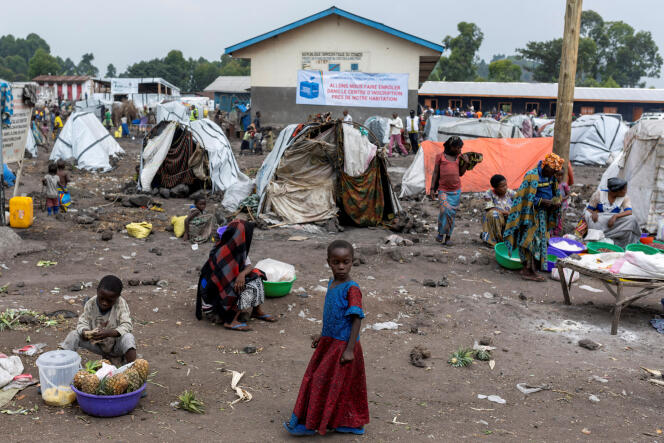
A distant explosion plunged the Birere shopping district, near the airport in Goma, one of the main cities in eastern Democratic Republic of Congo (DRC), into silence. In the stores, wholesalers and customers looked at each other, confused. Breaking the silence, a vegetable seller finally shouted out loud what the others secretly feared: "It's the M23 rebels!"
In the street, a few passers-by took out their phones to film. We waited, but nothing happened. No sound of boots, no bombs, no smoke. Timidly, business resumed. The insurgents of the March 23 Movement (M23) were still far from the regional capital, even though they had been operating in the Saké region for several weeks now.
It is in this area, about 30 kilometers from Goma, that Burundian soldiers, present in the DRC as part of the East African Community (EAC) force, are soon expected to deploy to try to stem the advance of insurgents and the action of armed groups. The Burundian troops are in addition to a Kenyan army contingent of about 1,000 men deployed in and around Goma since November 2022. South Sudanese and Ugandan forces are also expected to arrive in the DRC to round out the EAC's military presence.
Prices have soared
The M23 rebels have pledged to cease hostilities as of Tuesday, March 7. This promise was made in Luanda to the African Union mediator, Angolan President Joao Lourenço. But for the people of Goma, the multiple announcements of withdrawal and the promised cease-fire have changed nothing. Since the capture of Mushaki on February 23, the last road supplying the regional capital is currently controlled by insurgents. As are the province's two other main roads.
Since fighting intensified in the spring of 2022, M23 has administered large swaths of North Kivu, and the region's agricultural lands – the territories of Rutshuru and Masisi – are difficult to access. At the Virunga market in Goma, fruit, vegetables, milk and meat are now arriving only in dribs and drabs. And prices are suffering. "Before the war, a bunch of beans sold for 2,000 Congolese francs [just under €1]. Today, they go for 3,200 Congolese francs [about €1.50]," explained a market gardener behind her stall.
Everywhere, prices have soared and "customers are coming less than before," said a lady selling root vegetables. "We used to get through a big bag of potatoes each day. Now it takes at least four days to sell the whole bag." "Charcoal has gone from 25,000 Congolese francs [about €11] to 80,000 Congolese francs [a little more than €35]," said another vendor. This usually cheap fuel is needed for cooking, in a province where only 3.1% of the population has access to electricity.
'Anti-Rwandan' slogans
The security situation is not only disrupting local supplies, it is also blocking the import of manufactured goods. "Part of the border areas with Uganda have been conquered by M23. The only accessible gateway we have left with the outside world is the one linking the DRC to Rwanda," said Jackson Kitambala, of the Comité Laïc de Coordination (CLC, "secular coordination committee"), an association close to the Conférence Episcopale Nationale du Congo (CENCO, the Episcopal Conference of the Democratic Republic of the Congo), a religious body with broad political influence.
Despite the worsening diplomatic and political crisis between Kinshasa and Kigali, the passage of goods has never been interrupted between the twin border towns of Goma and Gisenyi. However, relations between the two neighboring states are worsening. Kinshasa has accused Kigali of "aggression" against the DRC and of sending its army to fight alongside the M23 rebels. Several reports by the United Nations Group of Experts and the Kivu Security Barometer have confirmed, with evidence, Rwanda's direct involvement in the conflict. But Kigali refutes these accusations.
In Goma, "anti-Rwandan" slogans are regularly chanted during processions and angry protests are increasing despite the ban on public gatherings imposed by the military authorities, who have been administering the city since martial law was declared on May 6, 2021. In early February, incidents on the fringes of demonstrations resulted in the death of at least eight people, according to the Congolese army. During a "ghost town" day organized by several citizen movements on February 6, stores and at least one church were looted. A truck belonging to the United Nations peacekeeping mission (MONUSCO) was also attacked the following day. During the course of these incidents, the inaction of international forces – namely peacekeepers and African troops – was criticized in the face of Rwandan "aggression" and the M23 crisis.
'Anger runs deep'
"The people's anger runs deep because the crisis is a multifaceted one: it's economic, social and even health-related! Cholera has developed in the IDP [internally displaced people] camps on the outskirts of Goma," said Placide Nzilamba, secretary of the North Kivu civil society, a citizens' organization that brings together several associations.
In the locality of Kanyaruchinya, makeshift shelters are becoming more numerous every day. Other informal camps have also opened in recent weeks, notably in Bulengo, a neighborhood on the outskirts of Goma, where the lack of assistance is glaring. According to OCHA, the UN humanitarian coordination office in DRC, there were at least 602,000 displaced people in North Kivu province on January 31.
"Not a day goes by that I don't think of my pigs that I left behind at home. I've lost everything," lamented a farmer from Kibumba, an area partly occupied by M23, in front of the Kanyaruchinya camp's plastic tarpaulins that serve as his shelter. Like him, many farmers no longer have access to their fields and have no income. "The likelihood of these people participating in the next agricultural season is low," wrote the US Famine Early Warning Systems Network (FEWS NET), supported by the US Agency for International Development (USAID), in its January report. The food crisis could worsen as a result, affecting neighboring provinces, particularly South Kivu, which traditionally receive food from North Kivu.